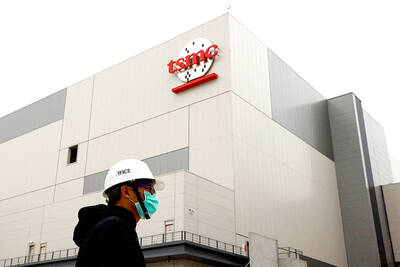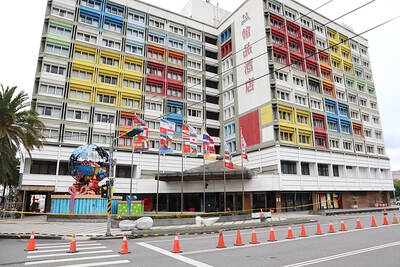The UK and India said they want to double their trade by 2030, ahead of a virtual meeting between British Prime Minister Boris Johnson and Indian Prime Minister Narendra Modi yesterday.
Seeking new trading partners after leaving the EU, the British government revealed the ambition along with an announcement of £1 billion (US$1.4 billion) of extra trade with India, which it said would create 6,500 British jobs.
“Like every aspect of the UK-India relationship, the economic links between our countries make our people stronger and safer,” Johnson said in a statement.

Photo: EPA-EFE
The extra investment comes ahead of negotiations for a formal free-trade agreement, British Secretary of State for International Trade Liz Truss said.
“This is going to be a win-win for both countries,” Truss said on Sky News. “There are currently very high tariffs on products like cars and whisky into India — we want to see those tariffs removed to benefit businesses in Britain.”
UK-India trade is worth about £23 billion per year, the British government said.
In 2019, 1.1 percent of UK exports went to India, and 2 percent of Britain’s imports came from the country.
The Johnson-Modi call comes as India battles a deadly new wave in the COVID-19 pandemic, and Britain has been helping send emergency equipment and oxygen.
Johnson said that the extra trade from their deeper economic partnership would boost their respective recoveries from the pandemic.
The trade package includes £533 million of new Indian investment into the UK in areas such as health and technology.
The highest profile deal is a £240 million investment by the Serum Institute of India into their vaccine business, the British government said.

Stephen Garrett, a 27-year-old graduate student, always thought he would study in China, but first the country’s restrictive COVID-19 policies made it nearly impossible and now he has other concerns. The cost is one deterrent, but Garrett is more worried about restrictions on academic freedom and the personal risk of being stranded in China. He is not alone. Only about 700 American students are studying at Chinese universities, down from a peak of nearly 25,000 a decade ago, while there are nearly 300,000 Chinese students at US schools. Some young Americans are discouraged from investing their time in China by what they see

Taiwan Semiconductor Manufacturing Co (TSMC, 台積電), the world’s largest contract chipmaker, yesterday reported record sales for the first quarter, which analysts attributed to solid demand for emerging technologies. Consolidated revenue totaled NT$592.64 billion (US$18.51 billion) in the January-to-March period, up 16.5 percent from a year earlier, but down 5.26 percent from the previous quarter, TSMC said in a statement. The first-quarter revenue beat analysts’ average projection of NT$579.5 billion, Bloomberg News reported. That performance lends weight to expectations that the world’s most valuable chipmaker would return to solid growth this year after weathering a post-COVID-19-pandemic cratering of smartphone and computer sales. TSMC is budgeting

HUALIEN BRANCH: The company had been planning to rebuild the hotel before it was damaged in the quake and vowed to give affected employees the option to transfer The owner of Chateau de Chine Hualien (花蓮翰品酒店) is planning to lay off 86 workers after shutting down the hotel due to damage it sustained in a powerful earthquake on Wednesday last week, the Ministry of Labor said yesterday. The hotel has submitted a layoff report to the Hualien County Government and expects to let 69 workers go this month and 17 next month, the ministry said. LDC Hotels & Resorts Group (雲朗觀光集團), the owner of Chateau de Chine Hualien, confirmed the layoff plan in a statement yesterday. LDC said the hotel has been closed since Wednesday last week when the temblor occurred

US CONSCULTANT: The US Department of Commerce’s Ursula Burns is a rarely seen US government consultant to be put forward to sit on the board, nominated as an independent director Taiwan Semiconductor Manufacturing Co (TSMC, 台積電), the world’s largest contract chipmaker, yesterday nominated 10 candidates for its new board of directors, including Ursula Burns from the US Department of Commerce. It is rare that TSMC has nominated a US government consultant to sit on its board. Burns was nominated as one of seven independent directors. She is vice chair of the department’s Advisory Council on Supply Chain Competitiveness. Burns is to stand for election at TSMC’s annual shareholders’ meeting on June 4 along with the rest of the candidates. TSMC chairman Mark Liu (劉德音) was not on the list after in December last